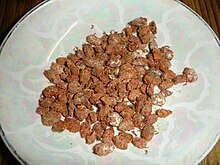Unani medicine
[2][3] The term Yūnānī means 'Greek',[4][5] referring to the fact that the Perso-Arabic system of medicine was based on the teachings of the Greek physicians Hippocrates and Galen.[7] Arab and Persian elaborations upon the Greek system of medicine by figures like Ibn Sina and al-Razi influenced the early development of Unani.There was a great exchange of knowledge at that time which is visible from the similarity of the basic conceptual frames of the two systems.[17] The Central Council of Indian Medicine (CCIM), a statutory body established in 1971 under the Department of Ayurveda, Yoga and Naturopathy, Unani, Siddha and Homoeopathy (AYUSH), monitors higher education in areas of Indian medicine including Ayurveda, Unani, and other traditional medical systems.[23] The government of Pakistan's National Council for Tibb (NCT) is responsible for developing the curriculum of Unani courses and registering practitioners of the medicine.
Alternative medicineHistoryTerminologyAlternative veterinary medicineQuackeryPseudoscienceAntiscienceSkepticismScientificTherapeutic nihilismAcupressureAcupunctureAlkaline dietAnthroposophic medicineApitherapyApplied kinesiologyAromatherapyAssociation for Research and EnlightenmentAuriculotherapyBates methodBiological terrain assessmentBlack salveBodyworkBone-settingBowen techniqueBreathworkFake COVID-19 treatmentsCamel urineCancer treatmentsCharcoal cleanseChiropracticChiropractic treatment techniquesVertebral subluxationChristian ScienceChromotherapyColloidal silverColon cleansingCoffee enemaColorpunctureConversion therapyCraniosacral therapyCrystal healingCupping therapyDental amalgam controversyDetoxificationFoot detoxDry needlingEar candlingEnergy medicineCorreactologyEsoteric energyTherapeutic touchEstrogen dominanceFabunan Antiviral InjectionFacilitated communicationFasciaBlasterFeldenkrais MethodFunctional medicineHair analysisHolistic dentistryHologram braceletHomeopathyBach flower remediesHydrotherapyHypnotherapyIonized jewelryIridologyJilly JuiceLightning ProcessLymphotherapyMagnet therapyManual therapyManual lymphatic drainageMedical intuitiveMegavitamin therapyMesmerismMind–body interventionsMyofascial releaseNaturopathyOil pullingOrgoneOrthomolecular medicineOrthopathyOsteomyologyOsteopathyOzone therapyParapsychologyPhrenologyPostural IntegrationPsychic surgeryPsychodermatologyQuantum healingRadionicsRapid prompting methodReflexologyRolfingScientific racismThetaHealingThomsonianismThought Field TherapyUrophagiaVaginal steamingVegetotherapyVision therapyVitalismYoung blood transfusionZero balancingBig Pharma conspiracy theoriesHIV/AIDS denialismOPV AIDS hypothesisAnti-vaccinationismVaccine misinformationVaccines and autismMMR vaccine and autismin chiropracticWater fluoridation controversyCOVID-19 misinformationTurbo cancerTraditional medicineAfricanSouthern AfricaAyurvedaBalneotherapyBrazilianBush medicineCambodian